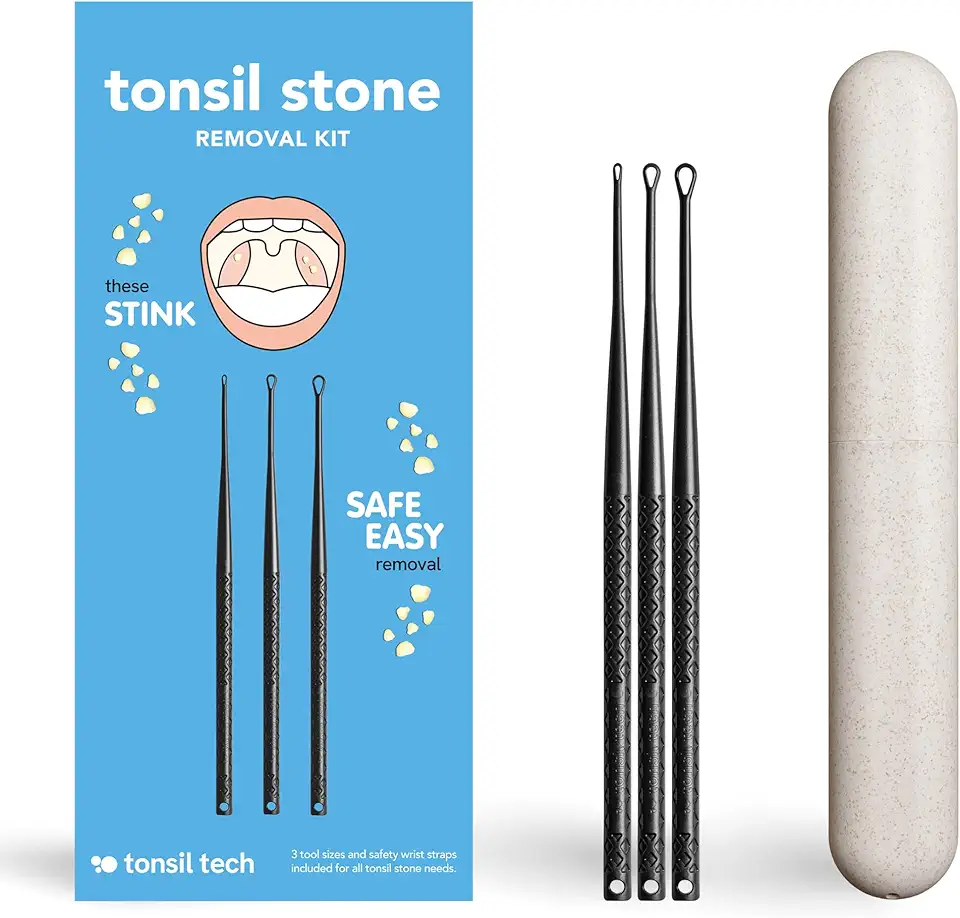
Tonsil stones, also known as tonsilloliths, are a common and often uncomfortable problem for many individuals. These small, calcified clusters can form on the tonsils and can cause bad breath, sore throat, and difficulty swallowing. While the exact cause of tonsil stones is still unclear, one question often asked is whether or not they last forever. In this article, we will explore the lifespan of tonsil stones and how to treat them effectively.
| Characteristics | Values |
|---|---|
| Duration | Tonsil stones can last for weeks or even months if not treated |
| Size | Tonsil stones can range in size from very small to quite large |
| Appearance | Tonsil stones are usually yellowish or whitish in color |
| Texture | Tonsil stones have a soft, squishy texture |
| Smell | Tonsil stones can give off a foul odor |
| Pain | Tonsil stones may cause discomfort or pain, especially when swallowing |
| Recurrence | Tonsil stones can come back even after being removed |
| Treatment options | Tonsil stones can be treated with oral hygiene practices, gargling, or in severe cases, surgical removal |
Explore related products
What You'll Learn

Understanding Tonsil Stones
Tonsil stones, also known as tonsilloliths, are hard, yellowish-white formations that can appear on the tonsils. They are composed of dead cells, bacteria, and food debris that get trapped in the crevices of the tonsils. Tonsil stones can vary in size and can be as small as a grain of rice or as large as a pea.
Causes of tonsil stones
Tonsil stones occur when debris, such as food particles, dead cells, and mucus, become trapped in the crevices of the tonsils. The tonsils have numerous crypts and crevices, which can easily become a breeding ground for bacteria. When the debris gets trapped and accumulates, it can harden and form tonsil stones.
There are several factors that can increase the likelihood of developing tonsil stones. These include poor dental hygiene, chronic sinus problems, post-nasal drip, and tonsil enlargement. The bacteria that cause tonsil stones thrive in an environment with low oxygen levels, making them more likely to develop in individuals with poor oral hygiene or who have conditions that lead to the presence of excess mucus in the throat.
Symptoms of tonsil stones
Tonsil stones may not always cause noticeable symptoms, and some individuals may have them without even knowing. However, when symptoms do occur, they often include:
- Bad breath: Tonsil stones have a foul odor, similar to rotten eggs or sulfur. This smell can be persistent and difficult to eliminate with regular oral hygiene practices.
- Sore throat: Tonsil stones can cause irritation and discomfort in the throat, leading to a sore throat. Some individuals may experience difficulty swallowing or a sensation of something stuck in their throat.
- White debris on the tonsils: Tonsil stones can be visible as white or yellowish deposits on the surface of the tonsils. They may appear as small, hard lumps or larger, more irregular formations.
- Ear pain: Tonsil stones can sometimes cause referred pain to the ears. Some individuals may experience aching or discomfort in the ears, even though the actual source of the pain is the tonsil stone.
- Swollen tonsils: In some cases, tonsil stones can lead to inflammation and swelling of the tonsils. This can make it difficult or painful to swallow and may also cause a hoarse voice.
It is important to note that the presence of tonsil stones does not always require treatment. If they are not causing any symptoms or discomfort, they may not require any intervention. However, if you are experiencing persistent symptoms or are concerned about the presence of tonsil stones, it is recommended to consult with a healthcare professional for an accurate diagnosis and appropriate treatment options.
Exploring the Effectiveness of Apple Cider Vinegar in Eliminating Tonsil Stones
You may want to see also

Can Tonsil Stones be Permanent?
Tonsil stones, also known as tonsilloliths, are small, white or yellowish deposits that form in the crevices of the tonsils. They are often made up of bacteria, food particles, and dead cells that become trapped in the pockets of the tonsils. While tonsil stones can be a nuisance, causing bad breath and discomfort, many people wonder if they can be permanent. In this article, we will explore the duration of tonsil stones, factors that influence their longevity, and whether or not they can come back after removal.
Duration of tonsil stones
The duration of tonsil stones can vary from person to person. Some individuals may only experience tonsil stones once or twice in their lifetime, while others may suffer from recurring episodes. In general, tonsil stones can last anywhere from a few days to several weeks if left untreated. However, with proper self-care and treatment, such as gargling with salt water, using a water flosser, or using a cotton swab to remove the stones, their lifespan can be significantly reduced.
Factors that influence the longevity of tonsil stones
Several factors can influence the longevity of tonsil stones. These include:
- Poor oral hygiene: Inadequate oral hygiene can lead to the buildup of bacteria and debris in the mouth, increasing the likelihood of tonsil stone formation. Regular brushing, flossing, and using mouthwash can help reduce the risk.
- Chronic tonsillitis: Tonsil stones are more common in individuals with chronic tonsillitis, a condition characterized by recurrent inflammation of the tonsils. Addressing the underlying tonsillitis through proper medical treatment, such as antibiotics or surgical removal of the tonsils, can help prevent the formation of stones.
- Deep tonsil crypts: Individuals with deep tonsil crypts, which are the natural crevices or pockets in the tonsils, are more prone to tonsil stone formation. These deep pockets provide an ideal environment for debris and bacteria to accumulate. Regularly cleaning the tonsils with a water flosser or gargling with salt water can help prevent the buildup of materials that lead to tonsil stones.
- Diet: Certain foods, such as dairy products and sugary foods, can contribute to tonsil stone formation. These foods can promote the growth of bacteria in the mouth and enhance the production of mucus, which can result in the development of tonsil stones. Maintaining a healthy diet rich in fruits, vegetables, and drinking plenty of water can help reduce the risk of tonsil stones.
While tonsil stones can be removed, they can potentially come back if the underlying conditions that promote their formation are not addressed. Simply removing the stones without addressing poor oral hygiene, chronic tonsillitis, or deep tonsil crypts may not provide a long-term solution. Therefore, it is essential to practice good oral hygiene, seek appropriate medical treatment for underlying conditions, and maintain a healthy lifestyle to reduce the risk of tonsil stone recurrence.
In conclusion, tonsil stones can range in duration from a few days to several weeks. Poor oral hygiene, chronic tonsillitis, deep tonsil crypts, and diet can all influence the longevity of tonsil stones. While tonsil stones can be temporarily removed, they can potentially come back if preventive measures and proper medical treatment are not followed. If you are experiencing recurring tonsil stones, it is advisable to consult with a healthcare professional for further evaluation and guidance on managing the condition.
Uncovering the Link between Tonsil Stones and Colds: What You Need to Know
You may want to see also

Treatment and Prevention
Tonsil stones, also known as tonsilloliths, can cause discomfort and bad breath. Fortunately, there are various treatment options available to help alleviate this condition. In addition, taking preventive measures can reduce the likelihood of tonsil stone formation. In this article, we will discuss different treatment and prevention techniques to help individuals effectively manage tonsil stones.
Treating tonsil stones at home
Many people prefer to treat tonsil stones at home due to convenience and cost-effectiveness. Here are a few home remedies that can help:
- Saltwater gargles: Gargling with warm saltwater can help dislodge tonsil stones. Dissolve half a teaspoon of salt in a glass of warm water and gargle for 30 seconds. Repeat this several times a day to reduce inflammation and wash away accumulated debris.
- Oral irrigators: Using an oral irrigator, also known as a water flosser, can effectively remove tonsil stones. Direct the stream of water towards the tonsils, gently dislodging and flushing out any debris. Be cautious not to use excessive pressure to avoid injuring the tonsils.
- Manual removal: For visible tonsil stones, manual removal can be an option. Wash your hands thoroughly and use a cotton swab or a clean finger to gently push on the tonsils near the stone. Apply gentle pressure until the stone pops out. Be careful not to push the stone further into the tonsil or injure the delicate tissues.
Medical interventions
If home remedies don't provide relief or if tonsil stones are recurrent and causing significant discomfort, seeking medical interventions may be necessary. Some options include:
- Tonsillectomy: This surgical procedure involves the complete removal of the tonsils. It may be recommended for individuals with severe or recurrent tonsil stones. Tonsillectomy is usually performed under general anesthesia and requires a recovery period.
- Laser treatment: Laser resurfacing is a non-invasive procedure that uses laser technology to remove tonsils stones. The laser energy vaporizes the stones without harming the surrounding tissues. This treatment is often quicker and less painful than traditional surgical methods.
Preventing tonsil stones
Prevention is key in managing tonsil stones. By adopting certain habits and making lifestyle changes, you can minimize the likelihood of tonsil stone formation. Here are some preventive measures to consider:
- Good oral hygiene: Brushing your teeth at least twice a day and flossing regularly helps remove food particles and bacteria that can contribute to tonsil stone formation. Use a tongue scraper to remove debris from the tongue surface as well.
- Regular gargling: Gargling with an alcohol-free mouthwash or an antiseptic rinse helps keep the tonsils clean and reduces the risk of bacterial growth. Incorporate this into your daily oral hygiene routine.
- Avoiding certain food and drink: Certain foods and drinks, such as dairy products and sugary beverages, can contribute to tonsil stone formation. Limiting their consumption can help prevent tonsil stones from developing.
In conclusion, treating and preventing tonsil stones requires a combination of at-home remedies and, in some cases, medical interventions. Home remedies like saltwater gargles, oral irrigators, and manual removal can help manage tonsil stones. However, severe or recurrent cases may require medical interventions like a tonsillectomy or laser treatment. By practicing good oral hygiene, regular gargling, and avoiding certain food and drink, individuals can take preventive measures to reduce the likelihood of tonsil stone formation. If you are experiencing persistent tonsil stones or severe discomfort, consult a healthcare professional for an accurate diagnosis and personalized treatment plan.
Do Tonsil Stones Trigger Headaches? Unveiling the Unseen Connection
You may want to see also
Explore related products

Complications and Management
Tonsil stones, also known as tonsilloliths, can be a bothersome condition that has the potential to cause a variety of complications. These small, white or yellowish formations that develop on the tonsils are a result of the accumulation of bacteria, debris, and mucus. While they are not typically a serious health concern, they can cause discomfort and lead to unpleasant symptoms such as bad breath and recurring tonsil infections. In this article, we will discuss the potential complications of tonsil stones and provide some management strategies to alleviate the symptoms and reduce the recurrence.
Potential complications of tonsil stones:
A. Bad breath: One of the most common and noticeable complications of tonsil stones is halitosis, or persistent bad breath. The accumulation of bacteria and debris in the tonsil crevices produces an unpleasant odor that can be difficult to eliminate with regular oral hygiene practices alone.
B. Tonsil infections: Tonsil stones can also increase the risk of tonsil infections, known as tonsillitis. The presence of tonsil stones provides a favorable environment for bacteria to thrive, leading to inflammation and infection of the tonsils. Symptoms of tonsil infections include sore throat, difficulty swallowing, and swollen lymph nodes.
C. Difficulty swallowing: As tonsil stones grow in size or become lodged in the tonsil crypts, they can cause discomfort or pain when swallowing. This can make eating and drinking challenging and may lead to weight loss or dehydration if left untreated.
Managing tonsil stones long-term:
A. Regular check-ups: If you are prone to developing tonsil stones, it is important to schedule regular check-ups with your healthcare provider or an otolaryngologist (ear, nose, and throat specialist). They can examine your tonsils and provide guidance on managing the condition effectively.
B. Prescription mouth rinses: In some cases, healthcare professionals may prescribe antimicrobial mouth rinses or gargles to help reduce the bacterial load in the mouth and decrease the formation of tonsil stones. These rinses should be used according to the prescribed schedule and instructions.
C. Lifestyle changes to reduce recurrence: Making certain lifestyle changes can also help reduce the recurrence of tonsil stones. These include maintaining good oral hygiene by brushing your teeth at least twice a day, flossing regularly, and using an antibacterial mouthwash. Drinking plenty of water and staying well-hydrated can also help prevent the accumulation of debris in the tonsils.
In conclusion, while tonsil stones are not typically a serious health concern, they can cause discomfort and lead to complications such as bad breath, tonsil infections, and difficulty swallowing. Managing tonsil stones long-term involves regular check-ups, prescription mouth rinses, and making lifestyle changes to reduce the recurrence of these troublesome formations. If you are experiencing any symptoms or concerns related to tonsil stones, it is important to consult with your healthcare provider for appropriate diagnosis and treatment options.
Tonsil Stones: Can They Lead to Swollen Glands?
You may want to see also
Frequently asked questions
No, tonsil stones do not last forever. Tonsil stones, also known as tonsilloliths, are typically small and can be easily dislodged or removed through gentle rinsing or gargling. However, if left untreated, they can grow larger and become more persistent. In such cases, medical intervention may be required to resolve the issue.
Untreated tonsil stones can lead to various complications in the long run. They can cause bad breath, sore throat, ear pain, and difficulty swallowing. In addition, larger tonsil stones can create a feeling of a foreign object stuck in the back of the throat. If left untreated for extended periods, they can contribute to the formation of chronic tonsillitis or recurrent episodes of tonsillitis.
While there is no guaranteed way to prevent tonsil stones from reoccurring, there are measures you can take to reduce their likelihood. These include practicing good oral hygiene by brushing your teeth and tongue thoroughly, using mouthwash, and flossing regularly. Gargling with saltwater or non-alcoholic mouthwash can also help dislodge any debris that may lead to tonsil stone formation. If you have persistent issues with tonsil stones, it may be advisable to consult with a healthcare professional for further guidance and potential treatment options.































